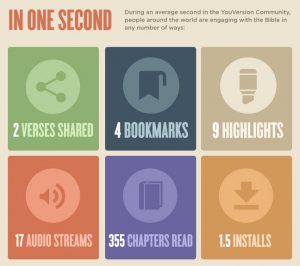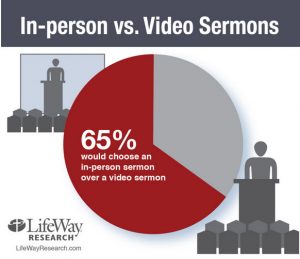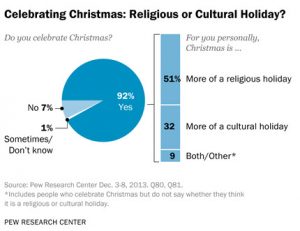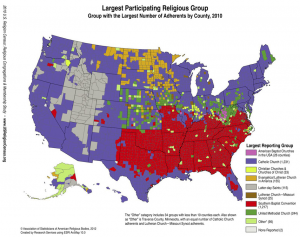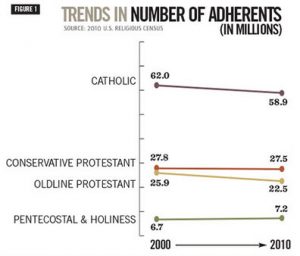The most popular Bible app, YouVersion, recently released data about how people used the Bibles they provide in 2013. The top five Bible verses are Philippians 4:13 - I can do all this through him who gives me strength. Isaiah 40:31 - but those who hope in the Lord will renew their strength… Matthew 6:13 - And lead us not into temptation, but deliver us from evil Joshua 1:9 - …Be strong and courageous. Do not be afraid; do not be discouraged… Philippians Read More …
Trends
Sermon Preferences (#1292)
According to the latest survey by LifeWay Research, most Americans prefer in person preaching to a video sermon when attending worship at a church. About a third (35%) indicated they will only visit churches with services of worship that feature live sermons. Strikingly, less than 1% prefer viewing a video sermon. So What? I have only attended one service of worship that featured a video recording of a pastor's sermon. Prior to that experience, I disliked the idea. Read More …
2014 = Year of the Bible? (#1289)
Jonathan Merritt, senior columnist for Religion News Service, recently suggested that 2014 may be known as the "Year of the Bible" thanks to five films: “Son of God” | 20th Century Fox (February 2014) “Noah” | Regency Enterprises (November 2014) “Heaven is For Real” | Sony Pictures (April 2014) “Exodus” | 20th Century Fox (December 2014) “Mary, Mother of Christ” | Lionsgate Films (December 2014) So What? The good book will certainly be represented on the big screen through Read More …
No Longer Taboo (#1286)
Zack Perkins, a blogger who is "trying navigate Christianity as a Millennial through the Orthodox way," recently shared a list of five uncomfortable issues the church needs to talk more about: addiction, sexuality, sincere doubt, mental illness, and loneliness. So What? Perkins is right when he suggests that the items appearing on his list are "issues that individuals in the Church are dealing with—issues that the Church Body should be talking about." I am thankful that I Read More …
My 2014 Resolutions (#1283)
I rarely participate in the annual ritual of crafting resolutions for the coming year. I did commit to one in 2012. This time, for 2014, I have settled upon three: Participate in worship in at least 10 different communities of faith Write at least 200 blog posts and be more actively engaged on Twitter Read at least 100 books and write reviews for at least 50 So What? New years bring new possibilities. While I expect a fair degree of the unexpected in the months ahead, Read More …
Top Posts of 2013 (#1282)
According to the number of page visits during this calendar year, the most popular posts I wrote in 2013 are Top 10 Books of 2012 1,000 Posts Pastor of Innovation Social Media Shortcomings Review of When Spiritual but Not Religious is Not Enough So What? I truly appreciate the feedback readers provide. You vote by clicking, and your interest in posts and topics is confirmed by the time you linger on my site. While this data is helpful, it tells only part of the Read More …
US Megachurches (#1277)
Warren Bird, research director at Leadership Network, recently shared some incredible statistics about megachurches (those congregations with an average weekly worship attendance of at least 2,000) in the United States. 5 million - the number of people who worship at a megachurch during a typical week. 1,650 - the current number of megachurches in the United States. 0.5% - While almost 10% of Protestant churchgoers attend a megachurch, these churches represent only about Read More …
Christmas: Cultural or Religious? (#1276)
Just in time for Christmas, the Pew Research Center released information about how Americans view the holiday. While 92% of Americans celebrate Christmas, there is considerable diversity when it comes to the basis of such celebrations: 51% - more of a religious holiday, 32% - more of a cultural holiday, and 9% - both/other (which includes those who celebrate but did not comment on whether they felt it was more religious or cultural). So What? Notably there is a generational divide. Read More …
Religion in America: A Map (#1275)
This map, based on the 2010 census data, shows the largest religious groups in each county of the U.S. So What? While the Catholic Church is the largest religious tradition in more counties than any other group, the Southern Baptists are a close second and are a majority in the vast majority of counties in the s0-called Bible belt. Take a moment to review Read More …
The Decade of Christian Decline (#1268)
2000-2010 can best be labeled as a decade of decline for American Christianity. David Roozen's recent piece in the Christian Century provides an important look at just how rapid the decline was for conservative/evangelical Protestants, mainline/oldline Protestants, and Roman Catholics. As a percentage, the declines were oldline/mainline: 13% Catholic: 5% conservative/evangelical: 1% So What? After decades of progressive Christianity, it should not be surprising to see Read More …
